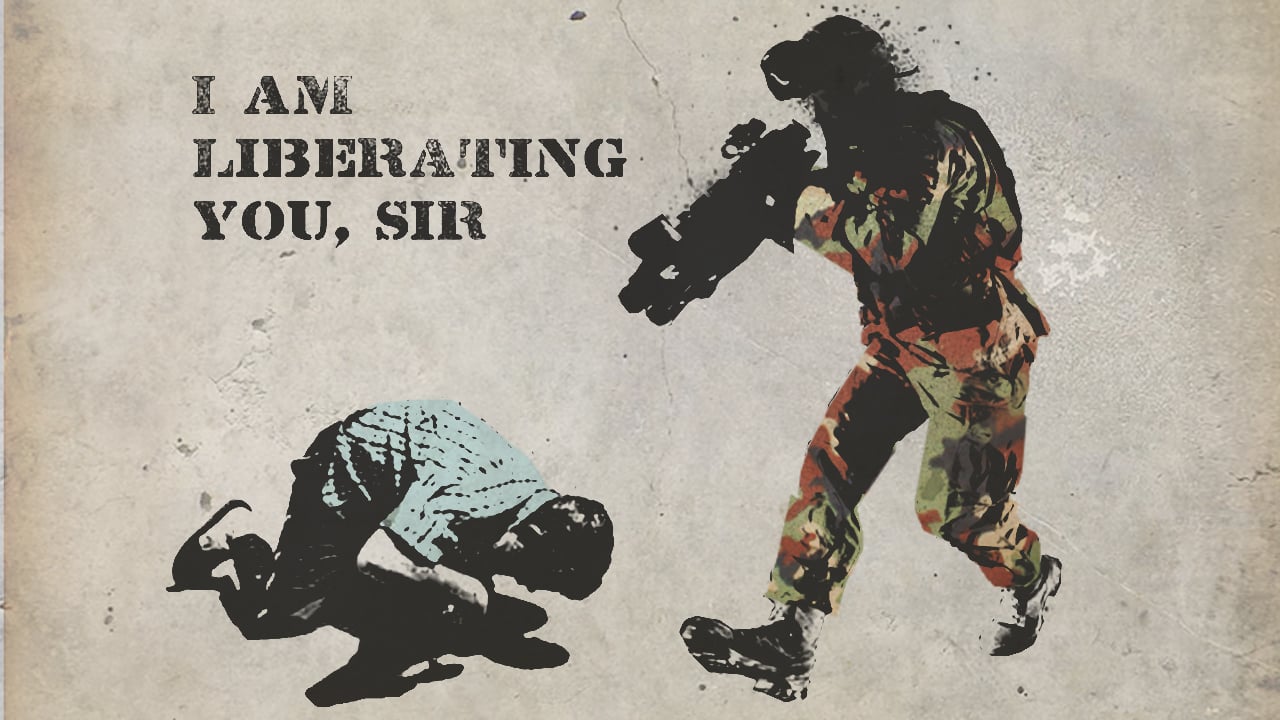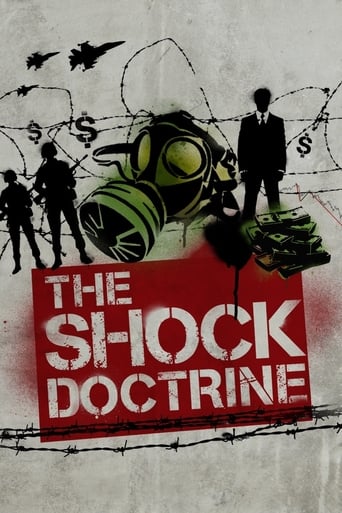Cubussoli
Very very predictable, including the post credit scene !!!
Peereddi
I was totally surprised at how great this film.You could feel your paranoia rise as the film went on and as you gradually learned the details of the real situation.
Dirtylogy
It's funny, it's tense, it features two great performances from two actors and the director expertly creates a web of odd tension where you actually don't know what is happening for the majority of the run time.
Kayden
This is a dark and sometimes deeply uncomfortable drama
imdb2-556-923983
The question on my mind after seeing The Shock Doctrine was whether ends justify means. Quite possibly, this is the question Klein wanted to be asked, because much of her case regards the distasteful means taken in order to further free market economics, tactics which the very proponents of these dogmas may feel they want to disassociate themselves with. However, my question was about Klein's/Winterbottom's own tactics.The film uses all methods that we've grown used to from modern politics: cherry-picked facts, "proofs" by emotionally-charged metaphors, hinted claims of guilt by association, sound-bite slogans that are repeated incessantly, and, of course, scare tactics. Sad to say, I've come to expect these things from political candidates that need to make their points in a 30-second TV appearance. I've even come to expect them in rating-seeking news programs. But have we stooped so low that these tactics are now par-for-the-course in documentaries, where a film-maker has 90 minutes of canvas to make a clear, compelling, and well-argued case? I happen to agree with Klein's stance that extreme capitalism is dangerous, and I think what we are seeing in both Europe and China in recent years (e.g. the collapse of Chinese nation-wide education and health policies) are just further proofs of the narrative Klein forwards. However, I don't see that there is a well-argued case here that would convince someone claiming that any change, good or bad, rarely happens in a peaceful way, or that the ultimate outcome of privatization is better than the alternative. In fact, only a handful of minutes of this film are devoted to the question of what the final outcome of extreme capitalism looks like, historically, and these minutes are full of unsubstantiated claims thrown into the air in what is exactly the tactic Klein warns against: shock a person for just over an hour, and suddenly that person becomes much more open to suggestion, at which point you can sprinkle some of your favorite dogmas on him.So, perhaps this film does a good job with all those who are willing to be convinced by visceral arguments, the likes of which have, unfortunately, come to dominate the public discourse, but I rather promote those who educate people to think. Scaring people to make the choices you think are right... well, that's what this film is all about. Isn't it?
ermanator_x-1
My 15 year old son came home with this "documentary" yesterday, and I decided that I better keep an eye on what he was watching.While I will credit the tremendous amount of research that went into this movie, I would have to say that it is fiction based on true historical events. The communist spin that was put on this is abysmal. Don't get me wrong, while being a firm believer in an open market system, I do see the pros and cons of both Capitalism and Socialism. However, this story only looks at the dirty underbelly of the free market system while allowing the viewer to believe that living in Soviet Russian or East Germany was as fine as a summer frolic on the beach until evil capitalists defeated the communist way and ruined the whole party. They even make the fall of the Berlin Wall seem like a tragedy that capitalists couldn't wait to exploit. The use of the same propaganda phrases used over and over again in this movie sickened me on more than one level. Comparing Capitalism to shock therapy, which was linked to and compared to torture and interrogation methods. They then made reference to (insert capitalist pig here) using any political, social, or environmental tragedy as "instigating the shock treatment" or simply "the shock" by using it as a way to defeat the will of the people who they are enforcing their capitalist regime on.At the end of the movie, I felt that I had to have a debriefing session with my son and his friend. While many of the unfortunate events that took place in the film were indeed blood on the capitalists hands, there is more blood on the hands of socialism/slash communism than even the Third Reich. I had to explain to him that while there was a rough transition from communism to capitalism in Eastern Europe, it was not unfortunate event that the Soviet Union broke and the Berlin Wall came down. I had to inform him that it was no picnic living in the Soviet states and that many had risked and lost their lives in order to climb the wall or flee other Communist states. It really is a shame that people forget history and that it really is doomed to repeat itself. I would recommend anybody who watched this to balance it out by learning about the bloody rise to power by the Soviets. Watch a documentary about Stalin, or the Chernobyl melt down and how the Soviets mishandled it and allowed their own people to suffer by having too much pride for western help. The bottom line here is that films like this are powerful form of propaganda and should be taken with a rather large grain of salt. It's just too bad that impressionable 15 year olds lack the knowledge, experience, and reasoning that is needed to watch this.2 stars is generous and is only given because the video was well researched and well made.
Java Bean
After watching this film with a few friends (one of which was a former World bank employee), we had a rather mixed and somewhat heated conversation in the cinema bar. The film is basically a summary of the book, which talks about the ideas of Milton Friedman and how they have been used to influence world affairs. However, for those of you who may find the film 'superficial' I would recommend the book, as there is much more detail. Regarding the objectivity of the film, I don't believe that it's anti-American or anti-capitalistic (as my world bank friend remarked). Quite the contrary, it is very balanced and in my opinion Klein does not point a finger at a company without first presenting the facts. I think what a lot of pro-capitalists probably find annoying about Klein is that she brings the whole idea of multinational dirty dealings and currents affairs into the spotlight. After all, Halliburton, Shell, BP, the World bank etc. are far from angels when it comes to making money! I for one, commend the producers of this film and Mrs. Klein for a job well done!
Chris Warrington
The adaptation of Naomi Klein's book 'The Shock Doctrine' seems to have been quite convoluted. First Alfonso Cuarón and his brother teamed up with Klein to make a 6 minute short film almost as a way of advertising the book. This is just a taster for the larger issue at hand. Whitecross and Winterbottom's feature-length documentary is a journey into the meat of the matter. Each of the snippets from Cuarón's film are expanded and the story is told over a grand, even epic, scale. This is the story of an economist called Milton Friedman and his idea. Perhaps not just an idea, given the remarkable effect of Friedman's 'idea' it just doesn't seem like a big enough word, but it will have to do. The idea is one that sounds attractive, it is beguiling in its simplicity and more than that, it offers the chance of a kind of utopia - it is the notion of the 'Free Market'. Klein's book, and this film, describe how Friedman's ideas on Free Market economics went from being a marginalised backwater of economic theory to being the reasoning behind so many international events in recent years. It is the story of how deregulated trading isn't a Utopian saviour but a dangerous and unpredictable beast powerful enough to bring a country to its knees.The argument is drawn clearly and with enough evidence to be compelling; from the military coups in Chile and Argentina through the right wing governments of Thatcher and Reagan, a stop off with Boris Yeltsin and the collapse of the Soviet Union and ending with our current embroilment in Iraq – Naomi Klein has drawn a path connecting all these events to the economic ideas of Milton Friedman. At points the power of the message is a little overwhelming, it made me angry to see the atrocities committed in the service of enacting national changes. To see the rich get rich and the poor, well the poor get eaten up by the system. It is horrible and brilliant. Sickening and yet so very clever, so smart as to be almost admirable – but that doesn't make it right. They are preaching to the converted with me, but I urge you to seek out this film. Find it and watch it and understand some of the underlying ideas that run our lives on a day to day and nation to nation basis. A word of warning though, you might get angry.

